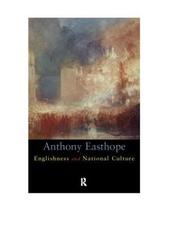
|
Englishness and National Culture
Paperback
Main Details
| Title |
Englishness and National Culture
|
| Authors and Contributors |
By (author) Antony Easthope
|
| Physical Properties |
| Format:Paperback | | Pages:256 | | Dimensions(mm): Height 216,Width 138 |
|
| Category/Genre | Literary studies - general
Philosophy of the mind |
|---|
| ISBN/Barcode |
9780415196888
|
| Classifications | Dewey:820.9 |
|---|
| Audience | | Undergraduate | | Postgraduate, Research & Scholarly | | Professional & Vocational | |
|---|
| Illustrations |
3 b&w photographs
|
|
Publishing Details |
| Publisher |
Taylor & Francis Ltd
|
| Imprint |
Routledge
|
| Publication Date |
10 December 1998 |
| Publication Country |
United Kingdom
|
Description
Two strangers with the same nationality meet for a chat for half-an-hour. There are a number of ways you could analyse their exchange, based on their class, race, gender, and so on. But their conversation would also be action out national identity, not only in what they said to each other but how it was said -- their shared references, the tone used, their jokes. 'Nation' is probably stronger than all other forms of group identity -- and it is the unconscious expression of it through specific forms of discourse which is perhaps the most fascinating aspect. In this highly engaging polemic, Antony Easthope examines Englishness as a 'form' and a series of shared discourses. Looking at examples of contemporary cultural practice from the seventeenth century to the present, Easthope writes of the powerful pull that Englishness exerts, and investigates the specific elements of nationality in the context of modernity. Englishness and National Culture asserts a profound continuity running through from the seventeenth century and today. It argues that contemporary journalists, historians, novelists, poets and comedians continue to speak through the voice of a long-standing empiricist tradition.
Reviews"Easthope breathes new life into what easily could have become another walk-through of the "culture wars.." [T]his book is a stimulating and valuable contribution to investigations of Englishness. Easthope's discursive analyses broaden the field beyond only examining cultural texts explicitly forged in the colonial crucible. Similarly, by beginning to identify specific markers of Englishness (empiricism, classic irony, denigration of the body), Easthope also moves past the thematicization of an identity founded throughout difference by instead offering the possibility that this dialectic might be located in the very rhetoric and form of the discourse itself. Furthermore, by looking at contemporary English expressions of nationness, this book opens up new ground for postcolonial criticism through the examination of post-imperial British texts whose very features betray the continuing legacy of Empire."
-"Novel
|